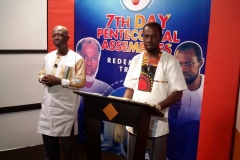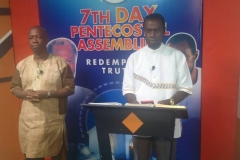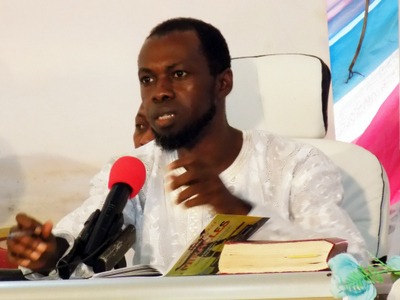Deliverance in a Time Accepted
By: Elder Enoch Ofori Jnr
There comes a time in the life of every believer when the devil attacks him with exceptional force and vexes his life. Eph. 6:13 calls it the “evil day”; Micah 7:8 uses the metaphor of darkness to represent it.
But as long as the time of trouble is a ‘day’ or a specific period, it will surely come to an end. And at the time God has determined.
God allows certain unpleasant things to happen at particular periods in our lives so that His greater glory will be revealed. When the disciples of Christ asked Him as to the cause of the predicament of a man born blind, here was His reply: “Neither hath this man sinned, nor his parents: but that the works of God should be made manifest in him” (John 9:1-3).
What were those “works of God” eventually manifested in the man by the miraculous touch of Christ?
In the man’s own words, an unprecedented record had been set, for “Since the world began was it not heard that any man opened the eyes of one that was born blind”. To the chagrin of the unbelieving Pharisees, both shamed and confused by the great miracle Jesus had performed, he added: “If this man [Jesus] were not of God, he could do nothing” (John 9:32-33).
What if the man had not been born blind at the time he was born and grown up to be a contemporary of Christ at the time he became?
That glorious miracle would certainly not have occurred; not that it would have been beyond God’s power, but then there would have been no such opportunity.
And we would have been poorer for it! The Bible would have been without one of its most hope-filled, inspiring miracles of all time!
Surely, the man had to be in the condition he was—and at the time he was—for the platform to be created for the manifestation of the greater glory of God!
Consider also the death of Lazarus. Although Jesus was informed of his sickness before he died, He deliberately waited for two days before setting out to see him (John 11:1-6). For the manifestation of the greater glory of God, Christ, by His deliberate delay, refrained from healing Lazarus of his sickness (which he could have done within the two days) and allowed him to die (v 15).
When Lazarus’ sisters Mary and Martha sent Him word that their brother was sick, this was what Christ said:
“This sickness is not unto death, but for the glory of God, that the Son of God might be glorified thereby.
“When he had heard therefore that he [Lazarus] was sick, he abode two days still in the same place where He was” (John 11:3-4).
By the time Christ arrived at Bethany, Lazarus’ hometown, he had been dead four days (v 17). As Martha went out to welcome the Lord Jesus, she said to Him ruefully: “Lord, if you had been here, my brother would not have died. But I know that even now God will give you whatever you ask” (John 11:21-22). To this Christ replied, “Your brother will rise again” (v 23 NIV).
As Jesus approached the funeral grounds and some of the mourners made Him out, the scene was set for that special glory of God for which Jesus had delayed His coming:
“But some of them [mourners] said, ‘Could not he who opened the eyes of the blind man have kept this man from dying?
“Jesus, once more deeply moved, came to the tomb. It was a cave with a stone laid across the entrance.
‘“Take away the stone’, he said.
‘“But, Lord’, said Martha, the sister of the dead man, ‘by this time there is a bad odor, for he has been there four days.
“Then Jesus said, ‘Did I not tell you that if you believed, you would see the glory of God?
“So they took away the stone. Then Jesus looked up and said, ‘Father, I thank you that you have heard me’.
“I knew that you always hear me, but I said this for the benefit of the people standing here, that they may believe that you sent me.
“When he had said this, Jesus called in a loud voice, ‘Lazarus, come out!’
“The dead man came out, his hands and feet wrapped with strips of linen, and a cloth around his face.
“Jesus said to them, ‘Take off the grave clothes and let him go’’’ (vv 37-44).
Lazarus had been dead four days; it was humanly speaking a totally hopeless situation. But when the time determined by God for the revelation of His glory came, there was no stopping the miracle that would ensure this! Whether the mouth of the cave was covered with a stone slab (comparable to a difficult situation from which one cannot extricate himself), or the body had begun to decompose and stink (a bad, hopeless situation beyond recovery/repair), Lazarus would come back to life—and just in time to manifest the glory of God!
Again, an unprecedented record was set: A 4-day-old stinking corpse brought back to life in a moment! It was for this reason that Jesus deliberately delayed His trip.
Jesus as healer was already an accepted fact; to heal another person was therefore no news. But Jesus as the “Resurrection and Life” who could bring back the dead—several days dead—to life was the unknown glory for which Christ had to allow Lazarus to die!
All along, Martha and Mary had limited Jesus’ power to help their sick brother to His healing abilities. So also was the expectation of the mourners (vv 21, 32, 37). That was their level of faith.
But Christ soon proved them wrong. The divine power He had been endowed with could do much more than heal the sick. It could raise the dead to life, and the death of Lazarus was the opportunity to demonstrate that!
The lesson: When the duration of the problems we face expire, no obstacle or power can hold us back! We fell momentarily, and now we have risen up by the power of God; for a moment we were enveloped in darkness, now the Lord has given us light (Micah 7:8).
As Ps 30:5 puts it, “weeping may endure for a night, but joy cometh in the morning”.
In “a time accepted” has He heard our prayer; the “evil day” has now given way to the “day of salvation” (Isa. 49:8; 2 Cor. 6:2; Ps 69:13). The set time has come:
“Thou shalt arise, and have mercy upon Zion: for the time to favour her, yea, the set time, is come” (Ps 102:13).
When the Jews were sent into exile for their disobedience, the set time for their restoration did not come until they had spent 70 years. The seventy years were not exceeded by another year. After exactly 70 years, the Lord remembered Jerusalem:
“Then the angel of the LORD said, LORD Almighty, how long will you withhold mercy from Jerusalem and from the towns of Judah, which you have been angry with these seventy years?
“So the LORD spoke kind and comforting words to the angel that talked with me.
“Then the angel who was speaking to me said, ‘Proclaim this word: This is what the LORD Almighty says: ‘I am very jealous for Jerusalem and Zion.
“But I am very angry with the nations that feel secure. I was only a little angry, but they added to the calamity.
“Therefore, this is what the LORD says: ‘I will return to Jerusalem with mercy, and there my house will be rebuilt. And the measuring line will be stretched out over Jerusalem,’ declares the LORD Almighty” (Zech. 1:12-16 NIV).
The set time had come for Jerusalem to be favoured and restored—and not a day passed!
So will the LORD do for each and every one of us. The time of His favour has come; His appointed time has come. The vision and the promise of God may appear to have delayed. But wait; at the appointed time they will be fulfilled.
In answer to Habakkuk’s complaint that the LORD delayed in listening to his prayer of help and in punishing evil (Hab. 1:2, 13), the LORD said:
“Write the vision, and make it plain upon tables, that he may run that readeth it.
“For the vision is yet for an appointed time, but at the end it shall speak, and not lie: though it tarry, wait for it; because it will surely come, it will not tarry” (Hab. 2:2-3).
In between the giving of the vision and its fulfillment concerning the punishment of Babylon, the LORD said the righteous among His people should patiently wait for it, trusting in His ability to bring it to pass. Hence the divine declaration, “the just shall live by his faith” (v 4).
It is estimated that it took 66 years for the vision to be fulfilled when Babylon, which had invaded Judah four years before, was punished and overthrown in 539 B.C.
And yet Habakkuk had stood watch on the tower in expectation of its imminent fulfillment (Hab. 2:1). But the LORD told him the vision was for an appointed time, at which point it will come to pass and not linger!
Because of the certainty of it, the LORD instructed the prophet: “Write the vision, and make it plain upon tables, that he may run that readeth it” (Hab. 2:2).
That the vision is sure or that the LORD has listened to our prayer should never be doubted, but we must leave the time of its fulfillment to God. At the set time, He will surely bring it to pass! (See Dan. 10:14).
In Num. 23:19 the rhetorical question is posed: “Has He [God] said, and will He not do it? Or has He spoken, and will He not make it good?” (NAS).
When the appointed time comes for God to make good His promise, He will do it swiftly—so swiftly that he that realizes it will run to announce it! (Hab. 2:2).
That was what happened when, in fulfillment of God’s word, Babylon fell and Judah was delivered:
“Then I looked up—and before me was a man with a measuring line in his hand! I asked, ‘Where are you going?’
“He answered me, ‘To measure Jerusalem, to find out how wide and how long it is.’”
“Then the angel who was speaking to me left, and another angel came to meet him, and said to him: ‘Run, tell that young man, ‘Jerusalem will be a city without walls because of the great number of men and livestock in it’.
“And I myself will be a wall of fire around it, declares the LORD, ‘and I will be its glory within” (Zech. 2:1-5).
At the appointed time, the vision will not linger but run to its fulfillment!
At the wedding at Cana when His mother wanted Him to perform a miracle (His first), Jesus calmly replied: “Mine hour is not yet come” (John 2:1-4).
However before His hour would come, Mary knew one thing was absolutely necessary: hope and faith must be kept alive! So she said to the servants, “Whatsoever He saith unto you, do it” (v 5).
It was not long before He ordered the servants: “Fill the waterpots with water,” and a miracle of great tasting wine occurred (vv 8-10).
Every prayer offered to God by sincere believers is heard by Him, but there is an appointed time for the fulfillment of its request and promise. The Lord Jesus tells us in Mark 11:24:
“Therefore I say unto you, what things soever ye desire, when ye pray, believe that ye receive them, and ye shall havethem.”
The time for fulfillment is God’s. Some prayers are answered instantly when the situation demands it or God judges it so. Others, however, take time. But invariably, without fail, God does hear the prayers of His faithful ones:
“And this is the confidence that we have in Him, that, if we ask anything according to His will, He heareth us:
“And if we know that He hear us, we have the petitions that we desired of him” (1 John 5:14-15).
As we wait for the fulfillment of His promise, let us not throw away the confidence we have in His ability to do all things. The just shall live (continue to hope, expect, etc) by his faith in His promise (Heb. 10:35). But if we disbelieve and give up hope in Him, He will have no pleasure in us (v 38).
Faithful is He that has promised, He also will do it (1 Thess. 5:24; Heb. 10:23). Because God doesn’t fail, let us continue to pray without ceasing (1 Thess. 5:17). The vision is for an appointed time; it will not tarry! Amen!



